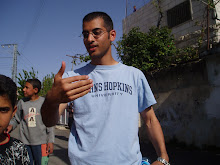 June 13
June 13Left: A picture of Yehia al-Jabari, the 72-year-old man whom the Israelis shot in the head; the banner is posted outside Hebron's Municipal Building (al-baladi). I just found it yesterday, hence the picture today...
Today was my first day in OR. I observed a general surgeon named Dr. Hashlamoon, whose name I’m sure I’m misspelling. He performed eight operations between 8 am and 2 pm, it was remarkably fast. He did two hernia excisions (one with repair and one without); a simple mastectomy for breast cancer on a male whom, a few years earlier, had the contralateral breast removed, also for breast cancer (for you non-medical people: that’s rare); a tracheostomy; two cholecystectomies (removal of the gallbladder); lanced a neck abscess, and one more operation that I can’t remember.
Completely out of the blue, one of the nurses in the OR decided to tell me about how much weight he has lost in the past year. The conversation started like this:
"Allo, what is your name?"
"Feroze. Shoo osmak?" ("What's your name?" I don't remember what his name was.)
"Min wain?" ("Where are you from?")
"Min Amrika, min wain inti?" ("From America, where are you from?")
"Khalil (Hebron). You know, since one year, I [pauses, his English was sparse] go away 20 kilos." Meaning "In the past year I lost twenty kilograms", which I suspect is an absurd exaggeration since this guy is barely 5'4''.
"Anjad?" ("Really?")
"Yes..." He then went on to explain exactly what he would eat every day, how he would exercise, how he had to convince his mother that he shouldn't eat knafe (he's in his late 30s), etc. This took about thirty minutes. Why he decided to tell me any of this I have no idea.
When I got home Musa and the family were watching al-Jazeera, al-Aksa TV (Hamas TV) and Palestine TV (basically Fatah TV) to figure out what was going on in Gaza. One of the stations said there was some fighting in Nablus (the West Bank’s largest city; I'll write more about Hamas TV later).
I told Musa I know where Fatah gets its ammunition (answer: from the US and Israel), and in Gaza I know where Hamas gets its ammunition (from tunnels under the Gaza-Egypt border), but where does Hamas get its ammunition from in the West Bank?
Musa chuckled to himself and then answered: “Hamas gets its ammunition from Israelis. From the people who, *struggles to think of a word*, they, *struggles some more*, the ones who sell guns and things.”
“From Israeli arms dealers?” I asked, a bit surprised. If I had thought about it for two seconds I wouldn't have been.
“Yes,” Musa replied. “Not legal of course, but, uh, yes, they will sell bullets and bombs and things to Hamas. Sometimes stolen from the army,” meaning from the Israel Defense Forces.
I started laughing, and so did Musa. Not because it's funny, of course, but at the sheer absurdity of the situation. Note again that security is obviously not the guiding concern with regards to the West Bank: Israel could easily regulate its own arms dealers, had it any motivation to do so.
I told Musa I know where Fatah gets its ammunition (answer: from the US and Israel), and in Gaza I know where Hamas gets its ammunition (from tunnels under the Gaza-Egypt border), but where does Hamas get its ammunition from in the West Bank?
Musa chuckled to himself and then answered: “Hamas gets its ammunition from Israelis. From the people who, *struggles to think of a word*, they, *struggles some more*, the ones who sell guns and things.”
“From Israeli arms dealers?” I asked, a bit surprised. If I had thought about it for two seconds I wouldn't have been.
“Yes,” Musa replied. “Not legal of course, but, uh, yes, they will sell bullets and bombs and things to Hamas. Sometimes stolen from the army,” meaning from the Israel Defense Forces.
I started laughing, and so did Musa. Not because it's funny, of course, but at the sheer absurdity of the situation. Note again that security is obviously not the guiding concern with regards to the West Bank: Israel could easily regulate its own arms dealers, had it any motivation to do so.
